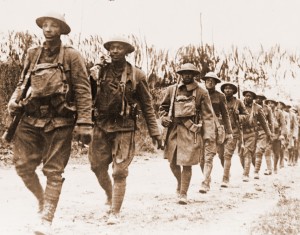
The United States joined the fight against Germany in World War I in 1917, about three years after the war began in Europe. For the majority of the war, President Wilson’s opinion (and one shared by many Americans) was that the United States had no part to play in the European war. Trade was conducted with the belligerent powers as best as possible but the general American attitude was one of isolation and apathy. Things began to change as the war progressed and the two embattled sides grew more desperate. The Germans instituted unrestricted submarine warfare against transatlantic shipping which resulted in much lost revenue for American companies and the loss of over one hundred American lives in 1915 when the Germans sunk the passenger ship Lusitania. In 1917, British intelligence agents intercepted and decoded a secret telegram from German agent Arthur Zimmermann to the Mexican government. The “Zimmermann Telegram” promised U.S. land to Mexico if the Mexicans supported Germany in the war. The British passed the telegram on to the American government. President Wilson, who had run his 1916 presidential campaign with the slogan “He kept us out of war”, asked Congress to declare war on Germany in the spring of 1917.
The United States forces arriving in France to fight the Germans boosted Allied morale and provided the Allied powers with extra industrial muscle. Within a year and a half of the American entry into the war, Germany surrendered and World War I ended. Although his troops had played a relatively small part in the war compared to the French and British, President Wilson was eager to be at the center of the peacemaking process. He had a grandiose vision of peace and freedom across the world. Wilson wanted to “make the world safe for democracy”. He wrote down “Fourteen Points” to world peace which he wanted to see instituted in the peace treaty. He wanted “peace without victory” where desires for revenge and retribution were unsatisfied. The French, led by Georges Clemenceau, and the British, led by David Lloyd George, wanted nothing to do with Wilson’s peace proposal. The German people yearned for a peace without defeat but the French and British, whose people had suffered greatly in the war, wanted nothing of it.
Wilson’s peace plan was rejected by the Allies and because of his failing health, he was unable to fight for its acceptance as well as he may have been able to in different circumstances. Wilson’s idea of an international community dedicated to protecting peace and order in the world, the League of Nations, was accepted but, thanks to Massachusetts Senator Henry Cabot Lodge, the U.S. Senate refused to ratify the treaty and join the League of Nations. Wilson died a man whose great ideals were left in the dust.
Meanwhile, American society had been touched in dramatic ways by the Great War. Women, who had been campaigning for suffrage for years, were given the right to vote. This was due, in large part, to the role that women had played in the wartime economy as they left their homes to take the place of men in the industrial sector. The women’s suffrage movement led to the prohibition movement and the passage of the eighteenth amendment to the U.S. Constitution prohibiting the sale of liquor. This in turn led to high crime rates in Urban areas like New York City and Chicago and the rise of the “gangster”.
America emerged from the First World War as the world’s uncontested industrial superpower. The United States had been the world’s largest industrial power before the war but after the destruction of Europe during the Great War, the United States stood heads above the rest of the world. America was also the world’s primary creditor following the First World War. Despite all this, the United States remained isolated from the rest of the world. The end of American Isolationism would not come until the aftermath of World War II. The fact that the United States did not participate in Wilson’s pet project, the League of Nations, demonstrated that this industrial giant would not become a major superpower until after the Second World War.
Note: This post is part of a series of blogpost on the First World War, leading up to the release of “World War I: The Unraveling of the World” by Jace Bower in the Fall of 2014. To see other posts in this series, type “Unraveling” in the search bar located in the top right corner of this page.
